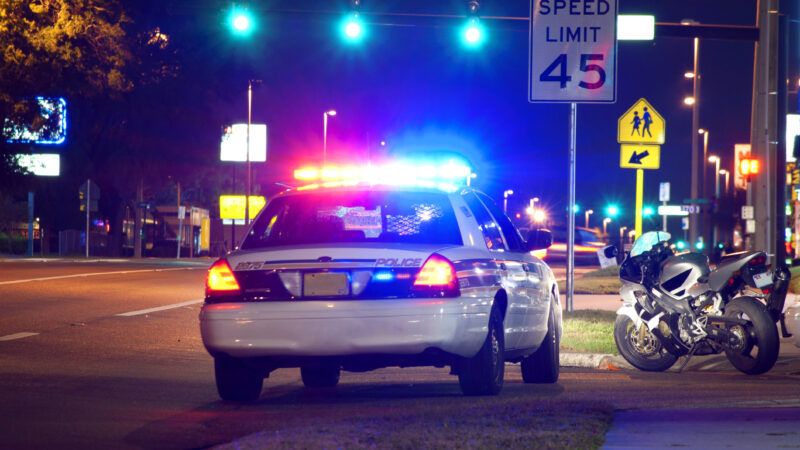Louisiana's New 25-Foot Legal Forcefield for Police Threatens Accountability and Civil Liberties
A new law will make it much harder to film law enforcement officers in their public duties. Does that violate the First Amendment?

Louisiana Gov. Jeff Landry last week signed a law that criminalizes approaching police officers within 25 feet, provided that the officer tells any would-be approachers to stand back, effectively creating a legal force field that law enforcement can activate at their discretion.
"No person shall knowingly or intentionally approach within twenty-five feet of a peace officer who is lawfully engaged in the execution of his official duties after the peace officer has ordered the person to stop approaching or to retreat," the law states. Offenders could receive a $500 fine and be jailed for up to 60 days.
The bill was authored by state Reps. Bryan Fontenot (R–Thibodaux), Michael T. Johnson (R–Pineville), and Roger Wilder (R–Denham Springs). Fontenot argued that the legislation would give law enforcement officials "peace of mind" as they carry out their duties. That's the same argument Florida Gov. Ron DeSantis made to justify signing Senate Bill 184 in April, which criminalizes approaching within 25 feet of a first responder with the intent to threaten, harass, or interfere with the official.
But some opponents of these laws believe they are overly broad and unnecessary.
"Requiring a 25-foot distance from a police officer may not be a practical or effective approach in many situations," state Rep. Delisha Boyd (D–New Orleans) tells Reason. "Policing situations vary widely, and a blanket requirement for a 25-foot distance may not account for the diverse scenarios officers encounter. Who on the scene will determine what exactly is 25 feet away? What happens if within that 25 feet is on my personal property?"
Louisiana already has a law outlawing "interfering with a law enforcement investigation." Critics of the new law say that an additional law proscribing the simple act of approaching police is superfluous.
One such critic is Meghan Garvey, the legislative chair and former president of the Louisiana Association of Criminal Defense Lawyers. Police work "is already protected from interference by current law," she tells Reason. "The measure criminalizes citizens for engaging in constitutionally protected activity and discourages citizen oversight of law enforcement."
The law, "like many other bills brought this session, seeks to make Louisianans more subservient to government," Garvey concludes.
The Louisiana Legislature passed a similar bill, House Bill 85, in June 2023, but that measure was vetoed by former Gov. John Bel Edwards. "The effect of this bill were it to become law would be to chill exercise of First Amendment rights and prevent bystanders from observing and recording police action," Edwards said in a statement explaining his veto.
Though the Supreme Court has declined to address the issue, there is significant legal precedent in the circuit courts—including in the 5th Circuit, which contains Louisiana—that the First Amendment's press and speech clauses collectively safeguard a "right to record the police." Last year, a federal judge struck down an Arizona measure that outlawed filming police from within 8 feet after receiving a verbal warning because it "prohibits or chills a substantial amount of First Amendment protected activity and is unnecessary to prevent interference with police officers given other Arizona laws in effect."
In Louisiana, "an officer could be arresting someone in a manner indicating excessive force, have a bystander approach to record the arrest, and the bystander could then be immediately told by the officer 'to stop approaching or to retreat,' chilling the bystander's right to record," Louisiana attorney Philip Adams tells Reason. "Thus, the bystander could be placed in a position in which the First Amendment right to record could be functionally neutered."


Show Comments (55)